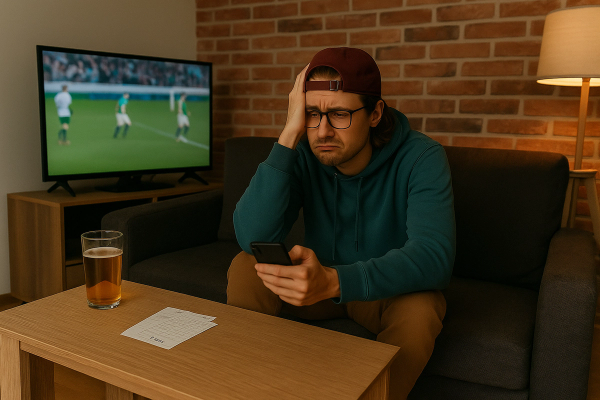When Your Bankroll Management System Isn't Working: Real Talk on Problem Gambling


HotTakes
You've read all the articles. You know the rules: never bet more than 2% of your bankroll on a single game, set loss limits, track every wager, separate your betting money from your living expenses. You've got the spreadsheet. You've got the plan.
But lately? The plan isn't working. You keep going over your limits. The loss limits that seemed reasonable last month feel impossible to stick to this week. You tell yourself "just one more bet" to get back to even, and suddenly you're in deeper than you planned.
Here's the thing: when a disciplined system keeps breaking down, it's not a discipline problem—it's a sign something bigger is going on.
The Self-Assessment Sharp Bettors Need
Let's cut through the noise with some direct questions. Be honest with yourself—nobody else needs to know your answers:
In the last 3 months, have you:
Bet with money you couldn't actually afford to lose (not your "entertainment budget," but rent money, bill money, savings)?
Lied to people you care about regarding how much you're betting or how much you've lost?
Borrowed money specifically to place bets or to cover gambling losses?
Felt like betting was the only thing that could make you feel better when you were stressed, anxious, or depressed?
Repeatedly told yourself "just one more bet" to get back to even, then ended up losing even more?
Spent time that should've gone to work, school, relationships, or self-care thinking about bets or placing wagers?
Felt like you couldn't stop betting even when you genuinely wanted to?
If you answered yes to two or more of these questions, keep reading.
What you're experiencing isn't a character flaw or a temporary rough patch—it's a pattern that needs attention before it gets worse.
Why This Happens: The Psychology Behind the Breakdown
Remember all that content about cognitive biases and emotional discipline in betting? The same psychological principles that affect betting decisions also explain why bankroll management systems fail when gambling becomes problematic.
Loss chasing
isn't just bad strategy—it's often a sign that betting has shifted from entertainment to emotional regulation. When you're using bets to manage stress, escape problems, or fill a void, no amount of "discipline" will make a spreadsheet system work. Your brain has hijacked your system for a different purpose entirely.
Escalating behavior
follows a predictable pattern: what started as entertainment gradually becomes necessity. You need bigger bets for the same feeling. You need to bet more frequently. The "rush" that used to come from a Sunday NFL card now requires daily action across multiple sports.
This isn't a moral failings—
it's how addiction works.
The same way someone can move from casual drinks with friends to problem drinking, gambling can progress from recreational to harmful. Recognizing this pattern early is actually the ultimate smart bettor move.
Immediate Action Steps: What to Do Right Now
If you're reading this and recognizing yourself, here's your playbook:
Soft Interventions (If you're early in recognizing the problem):
Set app limits immediately.
Most betting apps have built-in deposit limits and time restrictions. Use them. Set them lower than feels comfortable—that's the point.
Tell someone you trust.
Text a friend: "Hey, I think my betting is becoming a problem and I need to talk about it." Accountability changes everything, and shame dies when you share it.
Take a break.
Most legitimate betting platforms offer "cool-off" periods ranging from 24 hours to months. Use them. Your accounts will still be there if you decide to come back.
Hard Interventions (If the problem is more established):
Self-exclusion programs.
These tools allow you to voluntarily ban yourself from betting platforms for periods ranging from months to years. It sounds extreme, but it's one of the most effective tools available.
Professional help.
This isn't admitting defeat—it's the same as working with a trainer for physical fitness or a therapist for mental health. Gambling disorder is treatable, and people recover every day.
Financial safeguards.
Consider giving someone you trust access to your accounts (not to control you, but to add a layer of accountability), using apps that block betting sites, or working with a financial counselor.
Comprehensive Resources: Where to Get Help
United States
National Problem Gambling Helpline: 1-800-522-4700 Available 24/7 via call, text, or chat. Free, confidential support and referrals to local resources in all 50 states.
Text Support: Text "800GAM" to 1-800-522-4700
Online Chat: www.1800gamblerchat.org
Crisis Support: Text "SUPPORT" to 741741 for Crisis Text Line
Gamblers Anonymous: www.ga.org Free peer support meetings (in-person and online) based on the 12-step model
Mental Health Crisis: Call or text 988 for the Suicide & Crisis Lifeline
Canada
ConnexOntario (Ontario): 1-866-531-2600 24/7 support in 170 languages for mental health, addiction, and gambling issues
British Columbia: 1-888-795-6111 (Problem Gambling Help Line)
Alberta: 1-866-332-2322 (Addiction and Mental Health Helpline)
Saskatchewan: 1-800-306-6789 (Problem Gambling Helpline)
Manitoba: 1-800-463-1554 (Addictions Help Line)
Quebec: 1-800-461-0140 or 1-866-767-5389 (Gambling Help and Referral)
GamTalk: Online forums and chat support at responsiblegambling.org
RecoverMe App: Free mobile app using cognitive behavioral therapy for gambling problems. Use code
RECOVERME100
for free access.
CAMH (Centre for Addiction and Mental Health): Canada's largest mental health hospital with specialized gambling treatment programs
The Bottom Line
Look, we celebrate winning systems, smart bankroll management, and disciplined betting throughout this site. But the most disciplined move you can make is recognizing when the game has changed from entertainment to problem.
Reaching out for help isn't giving up on betting—it's ensuring that if you ever bet again, you're doing it from a healthy place.
Many people successfully return to recreational gambling after treatment. Many others decide it's not worth the risk and find different entertainment. Both outcomes are wins if they lead to a healthier, happier life.
The community here is about being smart with sports. Being smart means knowing when to step back, reassess, and get support. That's not weakness—
that's the ultimate edge.
If you're not ready to reach out yet, that's okay. Save these resources. Share this article with someone you trust. And keep checking in with yourself honestly. The help is there whenever you're ready for it.
If you or someone you know is struggling with gambling, help is available 24/7:
US: 1-800-522-4700 |
Canada: 1-866-531-2600 (Ontario) or find your provincial helpline above
This article is part of HotTakes' commitment to responsible sports engagement. For more resources, visit our blogs about Responsible Gaming.

